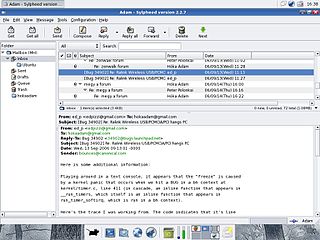Related Research Articles

Shareaza is a peer-to-peer file sharing client running under Microsoft Windows which supports the gnutella, Gnutella2 (G2), eDonkey, BitTorrent, FTP, HTTP and HTTPS network protocols and handles magnet links, ed2k links, and the now deprecated gnutella and Piolet links. It is available in 30 languages.

GNOME Evolution is the official personal information manager for GNOME. It has been an official part of GNOME since Evolution 2.0 was included with the GNOME 2.8 release in September 2004. It combines e-mail, address book, calendar, task list and note-taking features. Its user interface and functionality is similar to Microsoft Outlook. Evolution is free software licensed under the terms of the GNU Lesser General Public License (LGPL).

Sylpheed is an open-source e-mail client and news client licensed under the GPL. It provides easy configuration and an abundance of features. It stores mail in the MH Message Handling System. Sylpheed runs on Unix-like systems such as Linux or BSD, and it is also usable on Windows. It uses GTK+.

Apache SpamAssassin is a computer program used for e-mail spam filtering. It uses a variety of spam-detection techniques, including DNS and fuzzy checksum techniques, Bayesian filtering, external programs, blacklists and online databases. It is released under the Apache License 2.0 and is a part of the Apache Foundation since 2004.
Various anti-spam techniques are used to prevent email spam.

Email spam, also referred to as junk email, is unsolicited messages sent in bulk by email (spamming).
CRM114 is a program based upon a statistical approach for classifying data, and especially used for filtering email spam.

FreeMind is a free mind mapping application written in Java, which is further developed by the fork Freeplane until today (2021). FreeMind itself is at the state of 2014. FreeMind is licensed under the GNU General Public License Version 2. It provides extensive export capabilities. It runs on Microsoft Windows, Linux, and macOS via the Java Runtime Environment.
The following tables compare general and technical information for a number of wiki software packages.

Zimbra Collaboration, formerly known as the Zimbra Collaboration Suite (ZCS) before 2019, is a collaborative software suite that includes an email server and a web client.
MailScanner is an open source email security system for use on Unix email gateways and was first released in 2001. It protects against viruses, spam, malware, and phishing. It is distributed under the GNU General Public License.
A sandbox is a testing environment that isolates untested code changes and outright experimentation from the production environment or repository, in the context of software development including Web development and revision control.

ISPConfig is a widely used Open Source Hosting Control Panel for Linux, licensed under BSD license and developed by the company ISPConfig UG. The ISPConfig project was started in autumn 2005 by Till Brehm from the German company projektfarm GmbH.
Geobytes is a global company specializing in geolocation and anti-spam software. Geobytes was incorporated in the State of Delaware, USA in 1999 making it one of the oldest companies in the online geolocation industry.
In FOSS development communities, a forge is a web-based collaborative software platform for both developing and sharing computer applications. A forge platform is generally able to host multiple independent projects.
People tend to be much less bothered by spam slipping through filters into their mail box, than having desired e-mail ("ham") blocked. Trying to balance false negatives vs false positives is critical for a successful anti-spam system. As servers are not able to block all spam there are some tools for individual users to help control over this balance.
SmartScreen is a cloud-based anti-phishing and anti-malware component included in several Microsoft products, including Windows 8 and later, Internet Explorer, Microsoft Edge and Outlook.com. It is designed to help protect users against attacks that utilize social engineering and drive-by downloads to infect a system by scanning URLs accessed by a user against a blacklist of websites containing known threats. With the Windows 10 Creators Update, Microsoft placed the SmartScreen settings into the Windows Defender Security Center.
Amavis is an open-source content filter for electronic mail, implementing mail message transfer, decoding, some processing and checking, and interfacing with external content filters to provide protection against spam and viruses and other malware. It can be considered an interface between a mailer and one or more content filters.
Apache Allura is an open-source forge software for managing source code repositories, bug reports, discussions, wiki pages, blogs and more for any number of individual projects. Allura graduated from incubation with the Apache Software Foundation in March 2013.

Endian Firewall is an open-source router, firewall and gateway security Linux distribution developed by the South Tyrolean company Endian. The product is available as either free software, commercial software with guaranteed support services, or as a hardware appliance.